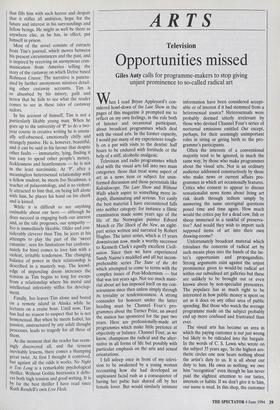Washed up and on the rocks
Harriet Waugh
NO NIGHT IS TOO LONG by Barbara Vine Viking, £15, pp. 320 About ten years ago Ruth Rendell went through a golden patch in her novel- writing. She was producing at least three books a year and bestrode criminal activity in England like a colossus. Perhaps because she was producing so much she adopted the pseudonym Barbara Vine, so as not to swamp the bookshops with Ruth Rendell titles. Her first two novels under that name, A Dark Adapted Eye and A Fatal Inversion, were masterpieces. After that, perhaps inevitably, came a slight falling off, and one no longer looked forward to them with quite the same intensity. Then, last year, the excellent Asta's Book appeared, and now with No Night is Too Long she has written another masterpiece.
As in the other Barbara Vine novels, the crime (which is hinted at, but only fully divulged towards the end), has already occurred, and the novel is the slow unravel- ling of the circumstances that lead up to it. The narrator is Tim Cornish, a young man of 25, living in his childhood home in a sea- side town in England. The town, referred to as 'N' — a symptom of Tim's creative writing course — hosts a music festival which provides him with a lowly job. He is there because he has committed a crime
that fills him with such horror and despair that it stifles all ambition, hope for the future and interest in his surroundings and fellow beings. He might as well be there as anywhere else, as he has, in effect, put himself in prison. Most of the novel consists of extracts from Tim's journal, which moves between his present circumstances and the past, and is inspired by receiving an anonymous com- munication from America telling the story of the castaway on which Defoe based Robinson Crusoe. The narrative is punctu- ated by further anonymous missives detail- ing other castaway accounts. Tim is so absorbed by his misery, guilt and terror that he fails to see what the reader comes to see in these tales of castaway sailors.
In his account of himself, Tim is not a particularly likable young man. When he goes up to the university of 'P' to do a two- year course in creative writing he is unusu- ally self-obsessed, emotionally chilly and strangely passive. He is, however, beautiful, and it can be said in his favour that despite other faults — immaturity, lying, finding it too easy to spend other people's money, fecklessness and heartlessness — he is not in the least narcissistic. At 'JP', after a meaningless heterosexual relationship with a fellow student, he meets No Steadman, a teacher of palaeontology, and is so violent- ly attracted to him that, on being left alone with him, he places his hand on his cheek and is kissed.
While it is difficult to sec anything estimable about our hero — although he does succeed in engaging both our interest and, as the tale progesses, our sympathy Ivo is immediately likeable. Older and con- siderably cleverer than Tim, he jeers at his attempts to play the part of the 'sweet catamite', sees his limitations but (unfortu- nately for him) comes to love him with a violent, irritable tenderness. The changing balance of power in their relationship is described in a masterly way. The knowl- edge of impending doom increases the tension as Tim begins to long for escape from a relationship where his moral and intellectual inferiority stifles his develop- ment.
Fatally, No leaves Tim alone and bored on a remote island in Alaska while he lectures on a cruise boat. Until now, Tim has had no reason to suspect that he is not homosexual. But when he meets Isabel, his passion, unstructured by any adult thought processes, leads to tragedy for all three of them.
At the moment that the reader has seem- ingly discovered all, and the tension inevitably lessens, there comes a thumping great twist. At first I thought it contrived, but against all the odds it works. No Night u Too Long is a remarkable psychological thriller. Without Gothic histrionics it deliv- ers both high tension and good writing. It is by far the best thriller I have read since Ruth Rendell's own Live Flesh.



























































 Previous page
Previous page